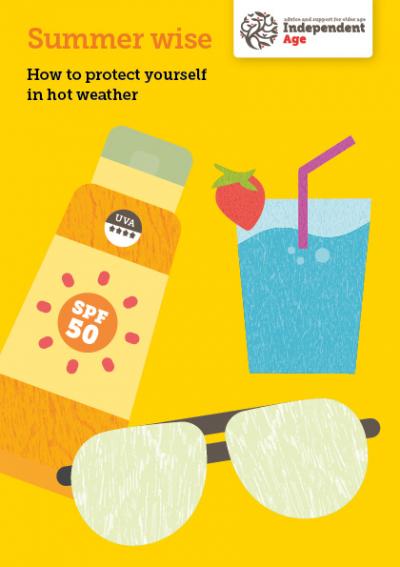Following the recent heatwaves, leading older people’s charity Independent Age has produced an invaluable advice guide entitled “Summer wise: how to protect yourself in hot weather”.
Summer sun is usually welcome, especially after a British winter, but it can also bring significant health risks for older people or those with a range of underlying health conditions. Luckily, there are many practical steps – set out in detail in the easy-to-read guide – to protect yourself from the heat and stay cool and healthy.
 As you get older, your body’s metabolism can slow down, meaning you’re less likely to notice if you feel hot or thirsty. If you do overheat, it can also take longer to cool down. Keep a close eye on the news for warnings of dangerously hot weather or visit the Met Office website by clicking here, then make sure you’re prepared by taking the following steps:
As you get older, your body’s metabolism can slow down, meaning you’re less likely to notice if you feel hot or thirsty. If you do overheat, it can also take longer to cool down. Keep a close eye on the news for warnings of dangerously hot weather or visit the Met Office website by clicking here, then make sure you’re prepared by taking the following steps:
Avoid dehydration by making sure you drink plenty, even if you don’t feel particularly thirsty. Aim to drink about eight glasses of water or diluted fruit juice throughout the day and evening, or more if it’s very hot and you’re losing fluids through sweating. Avoid caffeine, alcohol or high-sugar drinks which exacerbate dehydration, and eat cold foods such as salads and fruit as these contain water.
Remember, you can become dehydrated even before you start to feel thirsty. Symptoms include dizziness, headaches, feeling tired, having a dry mouth, lips and eyes and eventually feeling thirsty. You might also be passing water less frequently and when you do it is darker and stronger smelling. Remember, ‘pee white to feel right’.
If left untreated, dehydration can lead to conditions including urine infections, constipation and diminished kidney function. If you care for someone vulnerable to dehydration, for example, someone with dementia, make sure they keep sipping drinks throughout the day.
Check your meds! Some medications can amplify the effects of heat by making you sweat more, inhibiting your body’s own temperature control mechanisms, or restricting how much fluid you can drink. Check the information that comes with your pills and if you’re concerned, speak to your pharmacist or GP.
Dress to be cool. When the weather’s hot, wear loose-fitting, light cotton clothes to stay cool. If you’re going out in the sun, wear a hat, use sunscreen, take water with you and try to stay in the shade. Try to avoid going out or being physically active during the hottest part of the day, usually between 11am and 3pm.
If you feel hot, take a cool bath or shower or even just a cold wet flannel on the back of your neck can help cool you down. Air pollution can be worse in hot weather, which can seriously affect people with existing respiratory conditions. If you have to go out, make sure you take any medication you might need, such as an inhaler.
Keep your home cool by closing windows and curtains when direct sunlight is on them during the day and opening them at night, when it’s cooler outside (if it’s safe to do so). You could buy a good quality electric fan or even a portable air conditioner to use in the room where you spend most time. Put a thermometer in that room to keep an eye on the temperature and turn off non-essential light and electrical equipment which can generate heat. If your home becomes unbearably hot in the daytime, go somewhere air-conditioned like a local library, shopping centre or community centre.
Be aware of the two main conditions associated with excessive heat – heat exhaustion and heatstroke – and how to spot them.
Heat exhaustion has symptoms including loss of appetite and nausea, headache, dizziness and confusion, sweating heavily with a pale clammy skin, cramps, a fast pulse and rapid breathing, intense thirst and a temperature of 38°C or above.
If you have any of these symptoms, go straight to a cool place, lie down, drink plenty of water and remove excess clothing. Providing you don’t feel dizzy or weak, you could take a cool shower or bath. If you don’t start to feel better within half-an-hour, seek urgent medical advice by calling the NHS 111 helpline, or the emergency 999 number if you feel really unwell.
Left untreated, heat exhaustion can develop into heatstroke, which is a medical emergency requiring an immediate 999 call. Symptoms are similar, but more severe, including feeling very sick or being sick, having a severe headache, feeling very hot with a flushed skin but little or no sweating, becoming very confused, shallow breathing and feeling short of breath, and with a dangerously high temperature of 40°C or more. People with heatstroke might even suffer a fit or lose consciousness.
If you call 999 for anyone with these symptoms, try to cool them down while waiting for the ambulance by giving them water to drink, showering them with cold water or covering them in wet towels. If they are unconscious, put them in the recovery position and monitor them closely.
• You can download the new Independent Age ‘Summer wise’ advice guide by clicking here. You can also listen to an audio version of the guide on the same website page, order paper copies of the guide or phone the charity’s free helpline on 0800 319 6789.
